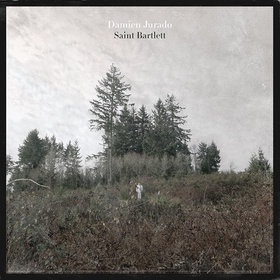
Damien Jurado
Saint Bartlett
(Secretly Canadian; 2010)
By Dom Sinacola | 18 June 2010
Damien Jurado, prolific indie voice of Middle America that he is, will seemingly, long past the point at which we all shimmy off this mortal coil, forever write the music of which Saint Bartlett is so humbly made. It’s easy to lose count of how many LPs he’s penned—to forget when it was just him or when he called his band by his name (as in: calling his whole band just “Dave Matthews”) like it mattered; to forget he’s from Seattle; to forget he used to be on Sub Pop and was discovered by Jeremy Enigk—and easier to balk at charting the course of his sound, what with all his found sound collages and reverb-soaked riffage and murder ballads amounting to pretty much the same sepia-tinged, roots-based folk epitomized by Where Shall You Take Me? (2003). In other words, the guy dumps albums on his fans like they’re going out of style, and keeping them all straight can be difficult for anyone without a heartland-sized jones for Jurado’s brand of plaintive ditties.
Turns out Saint Bartlett, recorded with labelmate Richard Swift in, by the looks of it, a field somewhere, is the best collection of songs Jurado’s put to tape since mid-career opus Take Me. Considering that, in the duration between that fine piece of work and this, Jurado’s released three albums of middling attempts to expand his sound past the vaguely southern gothic on which most fans now depend, Bartlett is the closest the guy’s come to a so-called “return to form.”
Not that he had far to go: On My Way to Absence (2005) and And Now That I’m In Your Shadow (2006) wreathed smoke around Jurado’s charm, making his post-Nebraska (1983) fatalism a touch phantasmagoric; and Caught in the Trees (2008) blew that smoke away, Damien Jurado the band in lockstep, solid and sensible. Or at least that’s how I remember it; it all runs together sometimes.
But Saint Bartlett, Jurado’s ninth album and a perfect place to start for the uninitiated, succeeds mostly because it seems to attempt nothing in particular. Like he’s prone, Jurado ruminates about and names his songs after small towns or smaller communities (here: Washington’s “Kalama” or the Seattle neighborhoods of “Beacon Hill” and “Wallingford”), peopling them with vague names and vaguer emotions—and instead of emerging from the woodwork worn and out of ideas, Jurado sounds warm, intimate, familiar, consistent. Like a well-fitting shoe. He taps effortlessly into what could pass as the highlights of his career—“Wallingford” churns like an I Break Chairs (2002) cut, violence belied by a funny almost-falsetto that’d be at home in Where Shall You Take Me?’s sense of dissolving innocence—and still manages to surprise with the barest of essentials (the haunting coda “With Lightning In Your Hands”; handclaps). If I’d been waiting all this time and all these albums to hear Damien Jurado finally comfortable in his own skin, then this is the moment.
As Jurado summarizes so concisely in “Throwing Your Voice,” what might as well be the lynchpin of the whole album, “I would like to think people change / But I’ve seen no evidence or the point it made.” The drums maintain their walking pace, an organ groans somewhere in the dusk, and Jurado, in perhaps the album’s sweetest moment, drawls, “You can come back when you need.” It’s a reassuring three minutes; Saint Bartlett: 35. See you when necessity calls.





